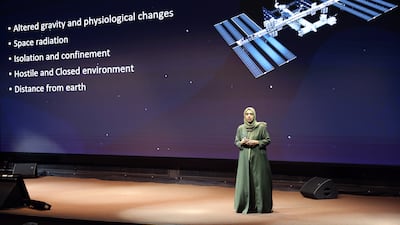To fix a problem you sometimes have to think outside the box. Astronauts do this when they venture into space, leaving behind a deep blue ball housing loved ones, their favourite cafes and beach promenades, to conduct experiments within a cold, black void the size of which could well be infinite.
While some humans travel to space for tourism, others are looking to service and even advance humanity. The interest in space lately seems to be (pun alert) rocketing.
Humans are returning to the Moon in December 2024 with the Artemis 3 mission; the UAE became the fifth country in the world to reach Mars; and closer to home – albeit 408 kilometres up – Saudi Arabia sent two astronauts to the International Space Station for the first time.

Other than being incredible achievements in an extremely dangerous environment, these bold forays into the unknown will probably bring healthcare benefits on Earth.
Somewhere above all our heads, four advanced research experiments in cell sciences were recently carried out by King Faisal Specialist Hospital and Research Centre in low Earth Orbit, as part of the AX-2 scientific mission.
Rayyanah Barnawi and Ali Al Qarni, the female and male Saudi astronauts on board the ISS, conducted experiments to investigate the inflammatory response of human immune cells in microgravity. Other ISS experiments included evaluating the impact of space travel on human health and assessing the safety of spaceflight on the human brain through measuring blood flow and electrical activity.
Medical breakthroughs over the past 20 years, as a result of microgravity research in space, have included progress in Alzheimer's disease, Parkinson's disease, heart disease, asthma and cancer.
The Ring-Sheared Drop investigation on the ISS in 2019, for example, involving abnormal fibrous, extracellular, proteinaceous deposits found in organs and tissues called “amyloids” might contribute to a better understanding of neurodegenerative diseases on Earth.
The evolution of telemedicine, meanwhile, can be traced all the way back to the early 1970s, when Nasa collaborated with Papago, a native North American tribe. Together they established a project titled Space Technology Applied to Rural Papago Advance Health, which became a springboard for developing techniques required for the remote delivery of health care.
Telemedicine technology was spun off by Nasa to enable physicians on Earth to provide remote care. Soon, the Artemis astronauts mentioned earlier will also benefit from these telemedicine techniques when they travel beyond the Earth’s orbit.
But what of now, and the future?

Space science can also help health care indirectly through its unique perspective of the planet. Earth observation satellites have been monitoring our climate for decades, providing data on the temperature of land, oceans and atmosphere, which shows that the planet is warming. Climate change poses health risks, worsening existing diseases and conditions, but also introducing new pathogens or pests into communities.
Satellite data also has the potential to see the impact of net-zero policies on climate change. With artificial intelligence rapidly evolving, we could see major advances in detecting climate-related issues on Earth. While still on the subject of AI, one startup in the healthcare industry is using a cognitive AI engine that was developed by Nasa for the Mars Curiosity Rover to power its own smart health platform.
Another consideration is the mental impact space travel can have. A space mission lasting for several months can challenge an astronaut's well-being. We have yet to build spaceships such as the ones you see in movies, with gardens and swimming pools.
Could VR therapy help prepare our space travellers for the psychological rigours of being in orbit – and beyond – for prolonged periods? These methods could be applied on Earth, and help in similar situations to mitigate the effects of stress and isolation. It might even help us during the next lockdown (but hopefully, it won’t come to that).
But let’s think bigger, much bigger.
Could space travel help us re-evaluate human life altogether? What does it mean to be human? These are difficult questions, but we evolved over millions of years to adapt to life on Earth. As we eye other planets and potentially other star systems, we might need to think about whether we are made of the right material.
According to estimates, the heart, blood vessels, bones and muscles deteriorate more than 10 times faster in space than by natural ageing. Recent research has shown changes to astronauts' microbiomes, cognitive functions, gene expressions and vascular systems.
What would be the bodily impact of a 21-month round trip to Mars? While travelling to the red planet, an astronaut would be exposed to 300 millisieverts of radiation – the same as 24 CAT scans – according to Nasa. On Mars itself, there is the risk of dust contaminating the airways, even while remaining indoors.
If we were more ambitious still and considered the closest exoplanet, Proxima Centauri b, our space travel would not only take longer – we would have to travel at the speed of light (which is far beyond our capabilities at present).
Space travel presents a good opportunity for us to understand ageing better as a chronic process, and help to identify ways to ensure better longevity fit for living on Earth and beyond.
On a more philosophical note, space exploration ignites our sense of wonder and expands our perception of the universe. It reminds us of the grandeur and fragility of our Pale Blue Dot and inspires us to ponder the profound questions about our place in the cosmos. This introspection can lead to a deeper appreciation for the interconnectedness of all life on Earth and a heightened commitment to improving global health.
I am exhilarated by the future that lies ahead. The convergence of space missions, advancements in AI and other technologies holds the promise of ground-breaking developments that could revolutionise health care and deliver numerous health benefits.
The fate of our planet might very well depend on the discoveries made far from the Pale Blue Dot.


